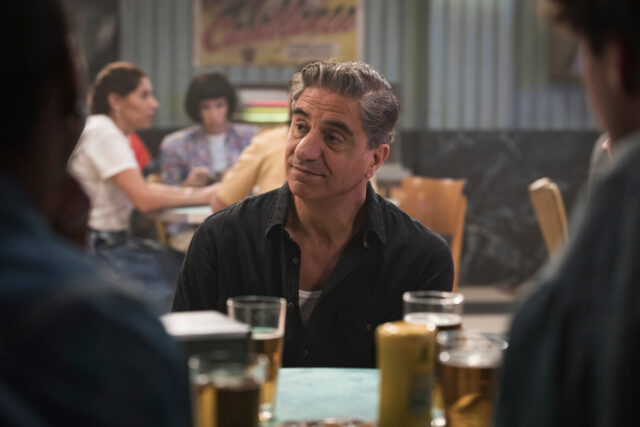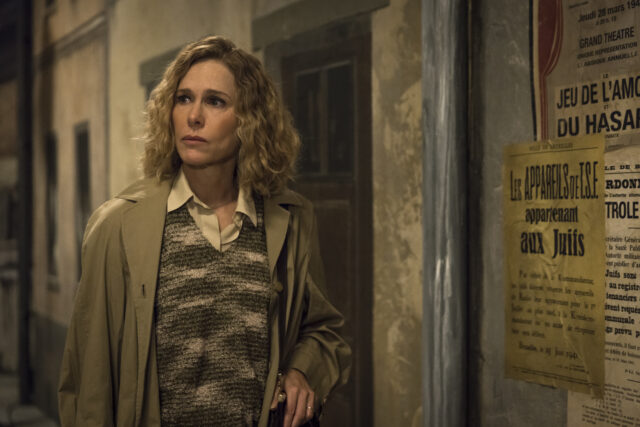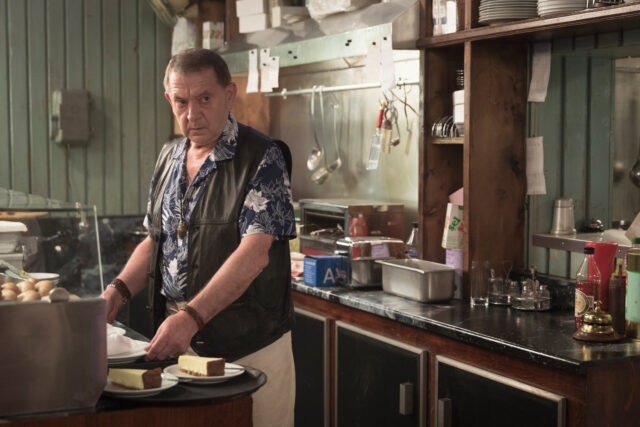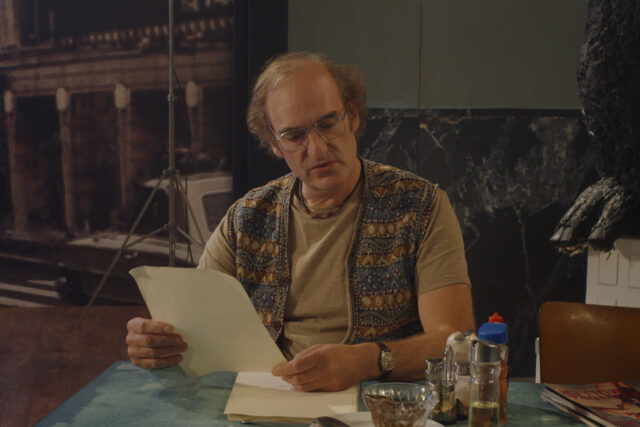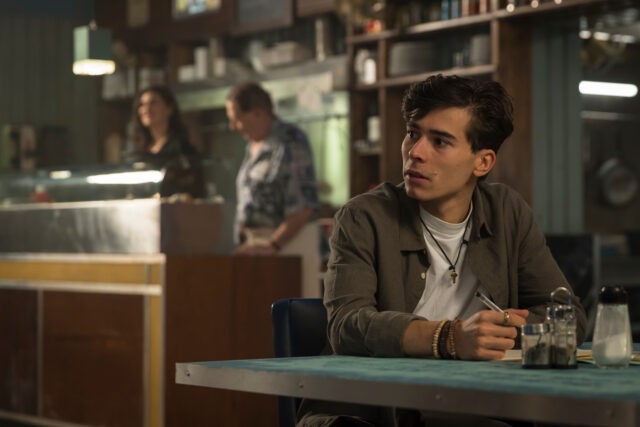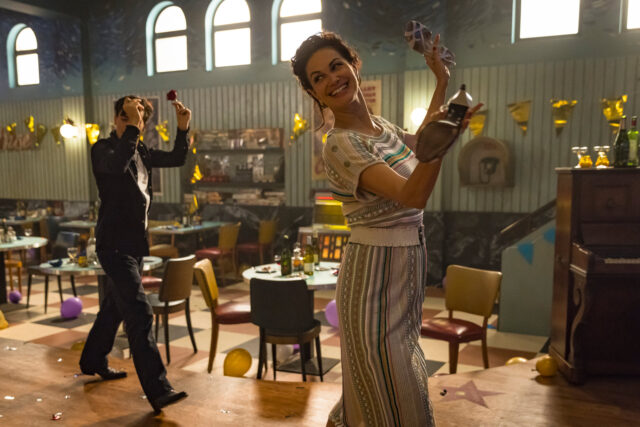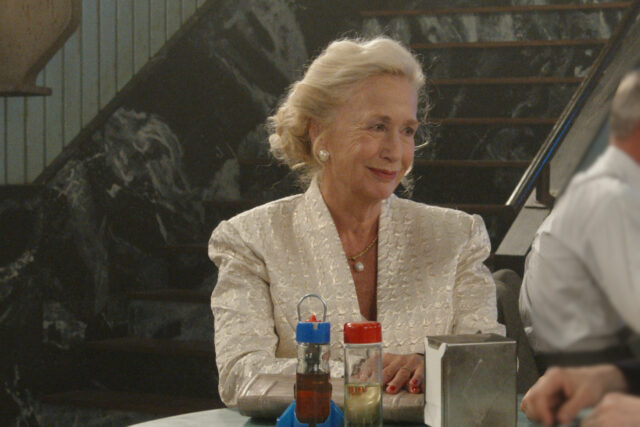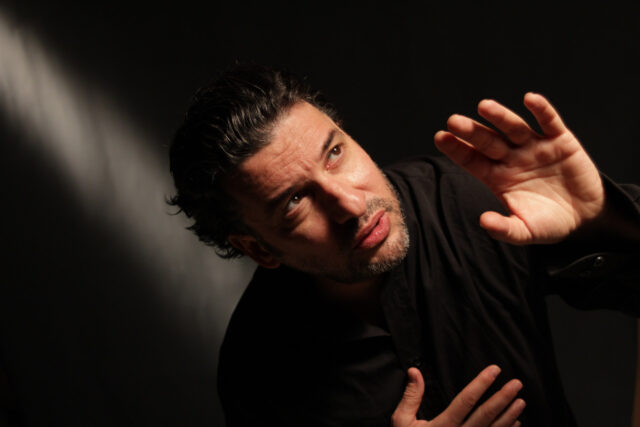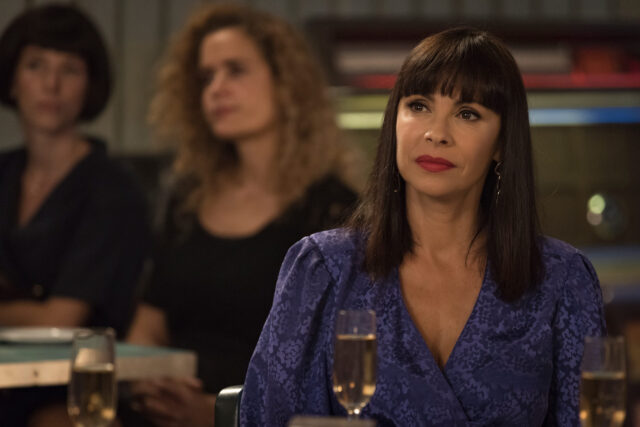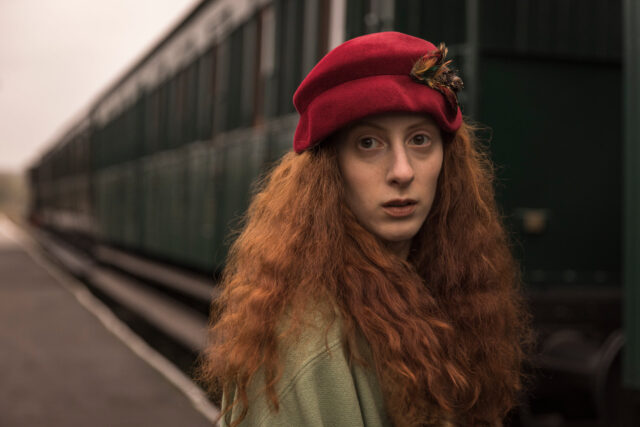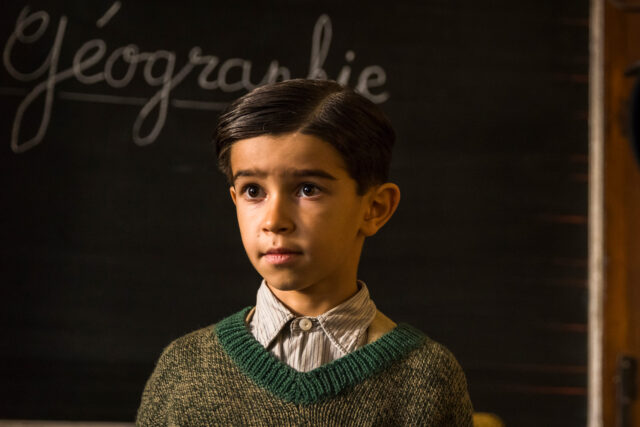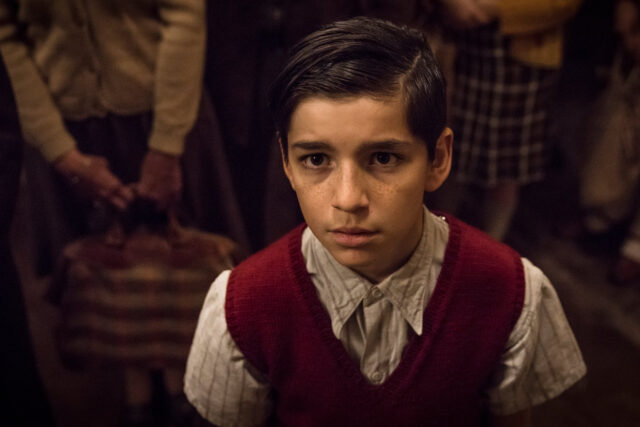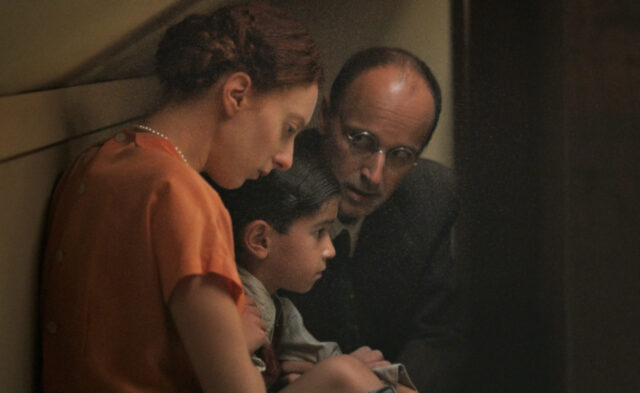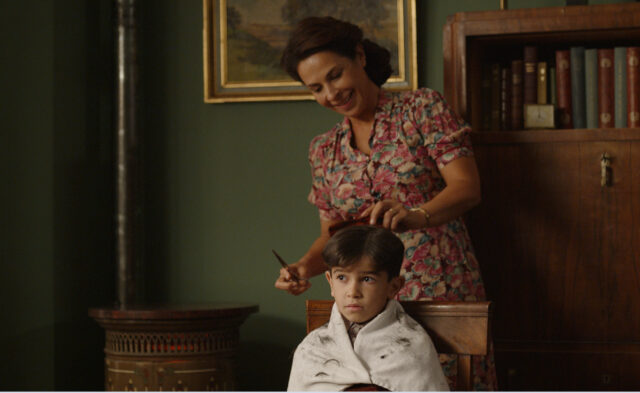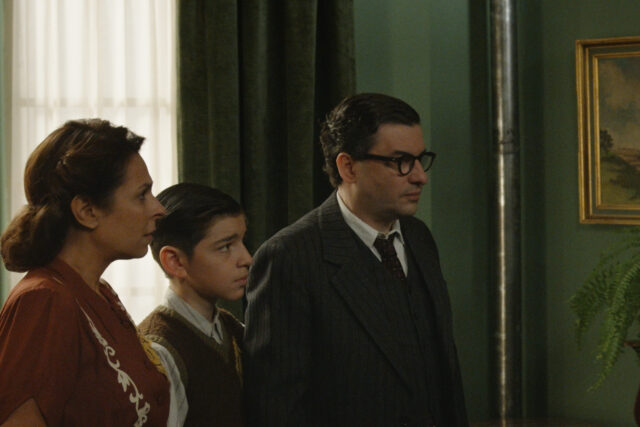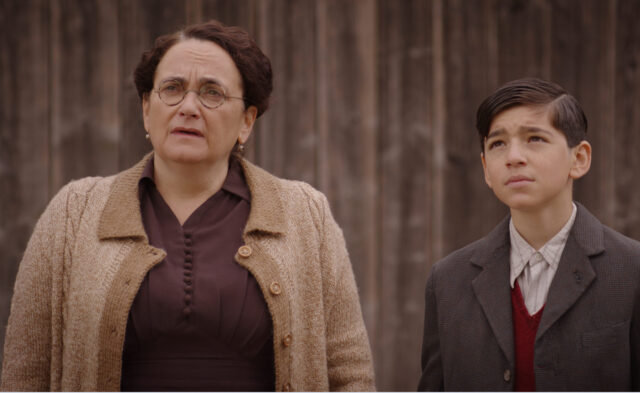SYNOPSIS AND CHARACTERS
How can we live with the abandonment of our parents, who are supposed to be there and love us unconditionally?
By inventing another world, a different reality, by living in a lucid dream that is, incessantly and day by day, reconstructed all over again.
It prevents us from thinking about our original trauma, gives us a thirst for life, while approaching others with as little risk as possible.
Saül Birnbaum is a “hidden child”, one of those who, at the age of only 6, had to be separated from his parents to escape the impending Shoah and be sent abroad by a so-called “Kindertransport”, from Vienna to Brussels.
In 1986, Saül is on the path to resilience. He reinvents his life and tries to re-enchant it by opening a delicatessen, unlike any other, where the 7th art of cinema triumphs, through permanent renditions on the stage of this restaurant, every single day. Saül and his protégé Joakin, a young Chilean director who fled from Pinochet, decide to write the story of Saül’s childhood and turn it into a film, allowing both of them to “heal” just a little more.
Alas, love comes knocking on Saül’s door and he is confronted with his past. She loves him, he loves her, she disappears, he loses himself, she comes back to him, he is reinvigorated, she abandons him again, he despairs…
The Way to Happiness is a story that teaches us to never, ever abandon love!
THE CHARACTERS
SAÜL BIRNBAUM
Descended from Jewish restaurant owners in Poland and Austria, SAÜL BIRNBAUM, an attractive man in his fifties, is the owner of a delicatessen in Brussels, “The New Manhattan Deli”.
He remains scarred by a childhood and adolescence that was shattered by antisemitic persecutions following the “Anschluss” of Austria: At the age of 6, he had to be separated from his parents who, in order to save him, put him on a “Kindertransport” from Vienna to Brussels. He was taken in by a Jewish Belgian family and was later hidden by a non-Jewish Belgian woman and owes them his life.
After these traumatising years, the wave of American movies that flooded Europe after the Liberation helped instil an “American Dream” in Saül, which he achieves by opening his deli. The establishment is almost as well-known for its Judeo-Brusselian food specialities, as it is for its celebration of cult cinema.
Through constant renditions, Saül acts or has his customers act out famous film scenes and organises all sorts of events and games around the themes of cinema.
Saül has taken a young Chilean student and exile, who dreams of becoming a director, under his wing. The young man prompts the writing of a script based on Saül’s own history.
While these activities help Saül with battling the demons of his past, they catch up with him whenever he is alone and withdrawn, away from the spotlights of his deli.
Multiplying his romantic conquests like there is no tomorrow, he tries to overcome the feeling of abandonment that has permeated his life since the brutal separation of his mother, and, later, his foster family.
His life is rocked when Hannah, a woman as beautiful as she is inconspicuous, visits his deli. They share the same passion for cinema and discover a common past which, at times, bring them closer, and other times, poisons their relationship.
Saül’s road to resilience, with plenty of back and forth and Hannah as a guiding thread, is paved with cinema, love, and humour.
HANNAH MOSKOWICZ
HANNAH MOSKOWICZ is a projectionist in an arthouse cinema in Brussels. She adores her work, which allows her to combine a hands-on job with her passion for cinema.
Since her first visit to the New Manhattan Deli, where she was drawn to by a newspaper article on Saül Birnbaum’s invigorating qualities, she spontaneously gives him the rendition of a scene by Ingrid Bergman in “Casablanca”.
Hannah, an escapee from Auschwitz, is plagued by the memories of her childhood, which she loathes to remember. She avoids Saül again and again. Still, she loves him and he loves her, but then she disappears, comes back and abandons him again.
Tormented by her past, Hannah must decide whether she wants to reveal her secret to Saül or not.
EDWARD KIEV
EDWARD KIEV, called “Ed”, is a man of sound judgment, with two feet on the ground, and who makes sure the New Manhattan Deli runs smoothly. He started out as a kitchen help at the Viennese restaurant of Saül’s grandfather. He knew Saül when he was still a child.
He too was lucky to have survived the antisemitic persecutions, though not without losing his parents, who were deported to the concentration camps in Auschwitz. After the war, he found refuge in Belgium and when Saül opened his Deli, he joined him and has since been a source of wisdom and support.
Always on alert, Ed is a sensible man with a big heart that he tries to mask with his stubborn and grouchy demeanour. His loyalty towards Saül is unwavering and he tries to shield him as best he can from the hazards of life. Just like his friend, Ed avoids solidifying a permanent relationship with a woman because he is too afraid of being abandoned. But his connection with Joakin’s mother Beatriz, will, step by step, allow him to come out of his shell and put him on the path of resilience and happiness.
ROBERT DE TRÉVIGNAC
ROBERT DE TRÉVIGNAC, called “Trévignac”, is a French film journalist who works in Brussels as a correspondent for foreign publications (Variety, Le Film français…). He spends the difficult ends of the month with review jobs and rewriting scripts.
A regular at the New Manhattan Deli, he likes the restaurant’s atmosphere and, most importantly, uses his cultivated knowledge on film culture to win Saül’s organised quizzes on the 7th art, to the great chagrin of the other customers. He agrees to get involved with the writing and promotion of Saül’s and Joakin’s film.
Trévignac is a man who is passionate about his work and develops a fondness for Joakin. He is none too keen on Saül’s tendency to interfere with the writing decisions and Joakin’s directing, and he pushes the latter to make his own choices instead.
JOAKIN ROJAS
Now in his twenties, this young Chilean arrived in Brussels when he was 10, accompanied by his mother who was forced to flee her country after Pinochet’s coup during which her husband was assassinated. Hired as a server at the New Manhattan Deli, JOAKIN ROJAS became attached to Saül, who instilled his passion for cinema in him. The young man even undertook studies at the INSAS (Institut Supérieur des Arts in Brussels), financed by his patron, who pushes him to write and direct a film based on Saül’s past.
The writing and realisation of this film will gradually emancipate Joakin from Saül’s influence, leading to conflict between the protégé and his mentor. Having grown through this experience, the young filmmaker will, nevertheless, encourage Saül to overcome his own fears.
BEATRIZ ROJAS
Joakin’s mother, BEATRIZ ROJAS, works as a cleaning lady at the New Manhattan Deli. She is a gracious woman, fierce, dynamic and always smiling. Her teasing playfulness ensnares the stern Ed. Her wisdom and practical mindset impress Saül towards whom she feels profound gratitude for the beneficial influence he has on Joakin.
The radiating personality from Chile will play an increasingly important role that lies at the heart of the Deli.
JUDITH ASKELEVICZ
JUDITH ASKELEVICZ, a bubbly 75-year-old woman, is a regular at the New Manhattan Deli. Here she can experience the flavours of her childhood and savour the nostalgia of the Yiddishland that has faded away.
She likes to think of herself as a fish in water in the field of cinema because her son “is a great actor.” She is a classic “Yiddishe Mame”, invasive and overprotective, who has endless admiration for her offspring.
PIERRE ASLON
After having studied acting at the Conservatory in Brussels, the son of Judith ASKELEVICZ, PIERRE ASLON, pursued a successful career in Paris. At 50 years old, he is a star of cinema, having won both the Cannes and César Award for Best Actor.
Despite his success, Pierre is always worried about tomorrow and tight with his money; under the pressure of his mother, he accepts a role in Joakin’s film and even agrees to produce it, secretly hoping the film will be a commercial flop in order to gain fiscal advantages.
He goes to therapy to try and escape the clutches of an overbearing mother!
SARAH GLÜCKSMANN
SARAH GLÜCKSMANN is a rich, seducing and generous widow who regularly flirts with Saül. In order to seduce him, she regularly tries to demonstrate her erudition in the field of cinema to him. She is a determined and confident woman, ready to eclipse any competition to get what she wants.
THE CHARACTERS OF THE “FILM WITHIN THE FILM”
RACHEL ROSENBLUM
The existence of this young Jewish mother from Vienna in her thirties was shattered by “The Anschluss”. She dedicates all of her energy into getting the necessary papers to get her husband out a concentration camp. A brave mother, she will tear her own heart out to save her child, David, by entrusting him to a “Kindertransport” without any certainty whether she will ever see him again.
DAVID ROSENBLUM (6 ans puis 11 ans)
DAVID ROSENBLUM is a lively, playful and courageous boy, ripped from his home country and parents by the “Anschluss”.
Separated from his mother at the age of six and arriving all alone in Belgium, a country that is completely unknown to him, he is taken in by a Jewish family and becomes the whipping boy in his class at school. After having settled in after some time, the anti-Jewish persecutions will once again destabilise his life.
He will remain hidden for two years, withdrawn and without any contact to the outside world or other children. His only hobby is reading books that are not always age appropriate and which often elude his understanding.
The boy thus forges his own rich but mindful personality, always on his guard and using self-deprecation as a protective measure. The bleakness of his childhood and adolescence will be mitigated by the magic of local cinemas where he discovers American films. But realising his dreams of becoming a filmmaker remains an unattainable goal for him.
SAMUEL ROSENBLUM
The father of David, SAMUEL ROSENBLUM, is, as his father and grandfather before him, a restaurant owner in Vienna. After the “Anschluss” his restaurant is requisitioned and he is deported, having presumably been denounced by a kitchen clerk.
Liberated from the camps, thanks to British visa obtained by his wife, he leaves Vienna for England. Weakened, unrecognisable, he is disheartened at not being able to take his son with him. He will later enrol in the British army to combat the Nazis.
HÉLÈNE SILBERSTEIN
HÉLÈNE SILBERSTEIN, a young Belgian woman without children, agrees to take in – presumably just for a short stay – a little Jewish boy from Vienna who she does not know.
She becomes attached to David who, after the German invasion, stays in her home in Brussels. When the antisemitic persecutions and roundups begin, Hélène is forced to go into hiding and to entrust the child to a non-Jewish woman in order to save him.
DANIEL SILBERSTEIN
DANIEL SILBERSTEIN, the husband of Hélène, is a simple and cheerful man who works as an artisan furrier from home. He also becomes attached to David quickly.
After the Liberation, he takes a now eleven-year-old David in once more and dedicates himself to the boy’s education. He wants David to find a “serious” job – as furrier like himself, jeweller or restaurant owner, in line with his family’s history – thus discouraging the boy’s ambitions to pursue a career in the field of cinema.
JUSTINE VERREKEN
This non-practising Catholic Belgian woman without any political engagement refuses to accept that children are persecuted. At the risk of her own life, she agrees to hide the young David at her home.
A common woman, simple, borderline illiterate, JUSTINE VERREKE works as a home-based seamstress and has hardly any time to take care of the boy. Nevertheless, by borrowing books from the communal library for David at random, she contributes greatly to the enrichment of his personality.




